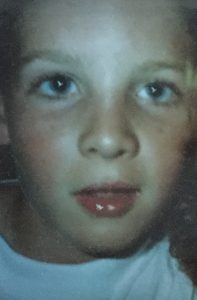Born in the early 1980s as the first child of… [*vinyl scratch*]
Wait a second! That’s not how you start a bio, is it?
[Obligatory fast-forward record sound here]

I started reading early, was quite tall for my age, and quite good at sports. I scored highly in my 11+ exam, and got into a grammar school.
School
One of the benefits of having a parent in the Armed Forces was that the government would pay towards education costs. Now, grammar schools are not fee-paying, but I went to one with a boarding school – and as there was a risk of my parents being moved around the world on deployment, it was pragmatic for me to board during the week.
Boarding school offered many benefits. It gave me much more social interaction with peers than I would have got at home – I liked talking with adults, and tolerated my peers. It also provided me with opportunities to get involved in sports. Lots of sports. Every day after school involved either rugby or football training, or was supplemented by our own kickarounds in the grounds of my boarding house. The main benefit of boarding school was that it enabled me to go to ‘a good school that would stretch me’.
There has been a lot said about grammar schools recently, since Theresa May announced she would allow new ones to open. Having lived through 7 years of grammar school, I think I am largely in the comprehensive is best camp – but that’s another post entirely.
So, all seems well. A bright kid leaves his primary school, where he has pretty much coasted, to join his ‘intellectual equals’ (eurgh) to push him academically.
At grammar school, I wasn’t out of my depth, I was able to coast through the junior years. Nothing really pushed me – nor was I motivated to ‘work hard’ academically. Most of my time was devoted to sport. However, when things are easy, there is no risk, there is no consequence. You just keep going.
Getting certified
I was predicted good GCSEs – pretty much A grades across the board. I didn’t expend much effort, and still got As and Bs (and an E in Design Technology Resistant Materials (or wood/metalwork) – but that was mandated and thoroughly pointless). Most of my revision time was spent watching South Africa’s tour of England on TV and then having a knock around outside. I did just enough to get by.
The step up to A-Level was good, I started to find some topics difficult to get my head around (mainly just organic chemistry – but the teacher was certified mental…), and I coasted to AABCc.
University
I applied to read Biochemistry at the University of York, however, just before starting I was involved in a car accident (my head ended up going through the car window).
I struggled to adapt to life at uni, and by the end of the second year, I had dropped out.
There were lots of reasons, including the complete reduction in my student finance, so I couldn’t cover my accommodation, let alone food. The biggest reason, however, was that I had never experienced failure.
I had coasted through 14 years of school, without being pushed, without much effort. Whether it was in the classroom or the sports field, I had success. Then as a newly-independent adult, I was plunged into a place where I was no longer in the top few percent. I was no longer special. I experienced the feeling that I actually wasn’t that good at something. It broke me. I never recovered from the first semester at university. I questioned who I was; my entire self-view had been shattered.
It took me a long time to recover from that failure. Through all the good years of education, I didn’t develop resilience. I had eaten at the top table of education for years without the fear of putting on weight, only to find my trousers no longer fitted and I didn’t recognise the face in the mirror.
I returned home a failure. My school friends had all gone to university, graduated, and gone on to get good jobs. I distanced myself from them on the nascent social network, facebook (you may remember it), and cut myself off completely.
Rebuilding

I spent 6 months as a Recruitment Consultant, and in that time ended up basically running the office; it is a horrible industry and I found out I am not a cut-throat salesperson. I spent some time working in a primary school, and quickly was given additional responsibilities as a Teaching Assistant and running activities at breaks and lunchtimes. I then spent time working for the local council, providing administrative support for community funding teams. I enjoyed working in the office, and felt respected, but felt the work wasn’t challenging enough. I used to get in as the doors were opened in the morning, and have completed my day’s work by morning coffee break. I would spend the rest of the day looking for extra work.
As my self-confidence, and sense of self-worth, grew, I realised I needed to address the cloud hanging over me. I needed to get a degree. It was the only way I could exorcise the demons of York.
So I enrolled to study Education Studies and Science at Bishop Grosseteste University. I successfully completed that course (although not without its own issues, such as having to self-fund it), and moved on to a Postgraduate Certificate in Education (PGCE). The letters after my name helped the cloud lift, but now that goal was achieved, I needed something else: I needed to help people.
Re-schooling
Having qualified as a teacher, I took a job in a challenging school in Nottinghamshire. I enjoyed my time in the classroom and began to hone my craft. I found I was really good at behaviour management and building relationships with my students – less so at all the paperwork.
As a teacher of science, and predominantly GCSE and A-Level, I became frustrated with the transmissive nature of the curricula – where was the opportunity to explore and develop students’ own learning? Why did we not build in opportunities for supported failure? Why do we not build resilience?
I became drawn to the struggling students. They had already experienced failure and were broken down by the system; I wanted to help build them back up again and give them confidence. So, I moved to an FE/HE college to work as a Learning Support Tutor. There I worked with students with specific learning difficulties to develop their skills and help them experience some kind of equality in education provision.
Over time, I found I preferred working with the HE students – many of whom had left school ‘early’ and had taken many years to re-engage with education. To many of them, attending university was a success. They had felt that they “weren’t good enough or clever enough” to get a degree. Seeing those students’ confidence build with each session was humbling, awe-inspiring, and a reminder that resilience helps us overcome.
The technology
I ended up working in ‘tech’ by accident really. The college was looking for staff to become e-Learning Advisors to support colleagues. As I was already the ‘techy-guy’ in our department, it made sense for me to apply. The role centred around supporting colleagues to develop their use of technology to support student learning. Instead of working with a handful of students, this new role allowed me to support lots of students at one time!
When a job came up at the University of Lincoln that tied together technology and educational development, I jumped at the chance. It provided me the opportunity to draw together my teaching practice, my understanding of theoretical educational underpinnings from my studies, my experience of supporting students with additional learning needs, and my understanding of technology to mediate the learning process. My role could directly influence the learning experiences of thousands of students.
The now
Working in a central support department in a University has provided me with the opportunity to help direct and drive the digital education agenda. Through my continued work with Jisc, and in particular the Digital Leaders programme, I have started to build a network of great people from across the sector.
Throughout my educational experiences, I have always felt something was wrong. It was probably me, but a little part of me thinks it might be the system. So I started to think about it – it was an entirely internal exercise.
Now I am ready to start to put some of those thoughts down for comment (and just in case I lose my mind). At least now, when you read them, you know my history.
This post is very much catharsis and a scene-setter for my future posts on my views of education. It may be useful in understanding why I think in the way I do. I’ve wanted to write this for years, and after Donna Lanclos and Dave White’s bios before their keynote at ALTC 2016, biographies are very much in vogue.


